social-emotional learning activities pdf free
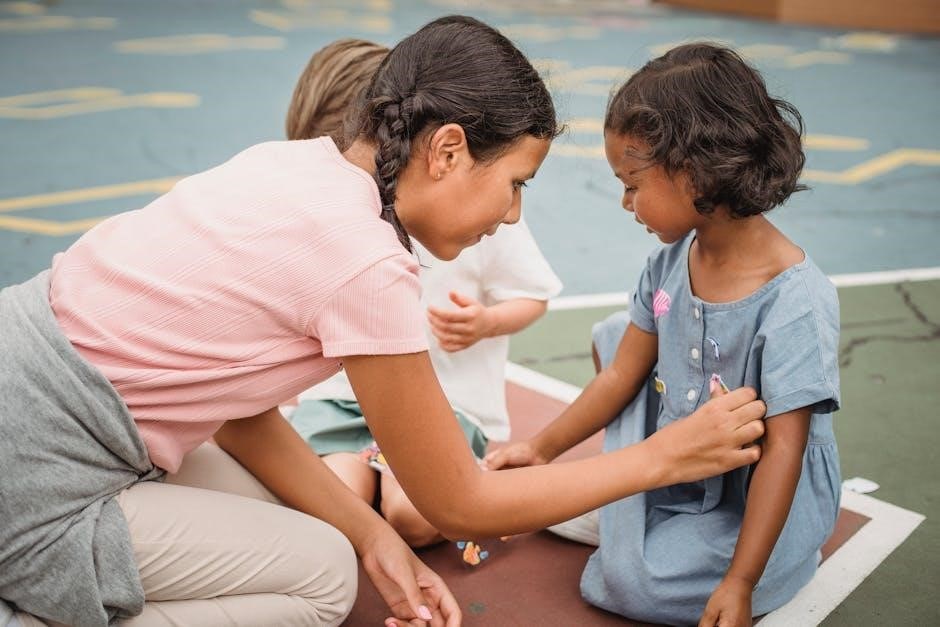
Social-Emotional Learning (SEL) is a vital approach in education, fostering self-awareness, self-management, social awareness, relationship skills, and responsible decision-making. It enhances students’ emotional well-being and academic success through engaging activities and free resources.
What is Social-Emotional Learning?
Social-Emotional Learning (SEL) is an educational approach that helps students develop essential life skills, including self-awareness, self-management, social awareness, relationship skills, and responsible decision-making. These competencies enable students to understand and manage their emotions, empathize with others, and build positive relationships. SEL fosters emotional well-being, improves academic performance, and prepares students to navigate life’s challenges confidently. By integrating SEL into education, schools create supportive environments where students can thrive socially, emotionally, and academically. Its benefits extend beyond the classroom, shaping resilient, compassionate, and collaborative individuals.
The Importance of SEL in Education
Social-Emotional Learning (SEL) plays a crucial role in education by equipping students with life skills that enhance their emotional well-being and academic success. SEL fosters self-awareness, self-management, and relationship skills, enabling students to navigate social dynamics and challenges effectively. It promotes empathy, kindness, and inclusivity, creating a positive classroom environment. SEL also improves academic performance by helping students manage stress, stay focused, and develop a growth mindset. By integrating SEL into education, schools prepare students to become resilient, collaborative, and compassionate individuals, ready to succeed in both their personal and professional lives while contributing positively to their communities.

Core Competencies of Social-Emotional Learning
Social-Emotional Learning focuses on five core competencies: self-awareness, self-management, social awareness, relationship skills, and responsible decision-making. These skills empower students to navigate emotions, relationships, and challenges effectively.
Self-Awareness Activities
Self-awareness activities help students recognize and understand their emotions, strengths, and challenges. Tools like emotion check-ins, journals, and reflective exercises encourage students to identify and express their feelings. Interactive games, such as “Emotion Charades” or “Feelings Bingo,” make learning engaging. Worksheets like “My Emotional Weather Report” allow students to visually track their emotions. Group discussions on personal values and goals also foster self-reflection. These activities promote a deeper understanding of oneself, laying the foundation for emotional intelligence and personal growth.
Self-Management Skills
Self-management skills empower students to regulate emotions, behaviors, and thoughts. Activities like mindfulness exercises, deep breathing, and physical movement help students stay calm and focused. Visual tools, such as emotion thermometers, teach students to identify and manage their emotional intensity. Problem-solving strategies and decision-making exercises encourage students to think critically and make positive choices. Group games and role-playing activities simulate real-life scenarios, helping students practice self-control and resilience. These practices foster self-discipline, enabling students to navigate challenges confidently and develop healthy habits for lifelong emotional well-being.
Social Awareness Exercises
Social awareness exercises help students understand and respect others’ perspectives, fostering empathy and kindness; Activities like group discussions, role-playing, and kindness challenges encourage inclusivity and diversity. Students learn to recognize and appreciate differences, building a supportive classroom environment. Reflection exercises, such as CASEL competency-based discussions, promote understanding of others’ feelings and needs. These exercises also include activities like “Accepting Differences Social Skills Story” and “Wrinkled Heart Kindness Activity,” which inspire compassion and positive interactions. By engaging in these exercises, students develop essential skills for building strong, empathetic relationships and creating a culture of inclusion and respect;
Relationship Skills Development
Relationship skills development focuses on fostering positive interactions and communication among students. Activities like group games, role-playing, and collaborative projects encourage teamwork and empathy. Students learn active listening, conflict resolution, and cooperation through exercises such as “CASEL Competency: Relationship Skills, Social Awareness” and “Wrinkled Heart Kindness Activity.” These exercises help students build trust, respect, and strong bonds with peers. By practicing these skills, students develop the ability to navigate social dynamics effectively, promoting a supportive and inclusive classroom environment. These activities empower students to form meaningful connections and thrive in collaborative settings.
Responsible Decision Making Practices
Responsible decision-making practices empower students to make thoughtful choices by considering consequences and ethical implications. Activities like “A Rose and a Thorn” and scenario-based discussions help students evaluate decisions. Interactive exercises, such as “Wrinkled Heart Kindness Activity,” encourage reflective thinking about the impact of their choices. These activities foster a sense of responsibility and accountability, teaching students to align their decisions with positive outcomes. By practicing decision-making skills, students develop the ability to navigate real-life challenges effectively, promoting personal growth and success in both academic and social contexts.
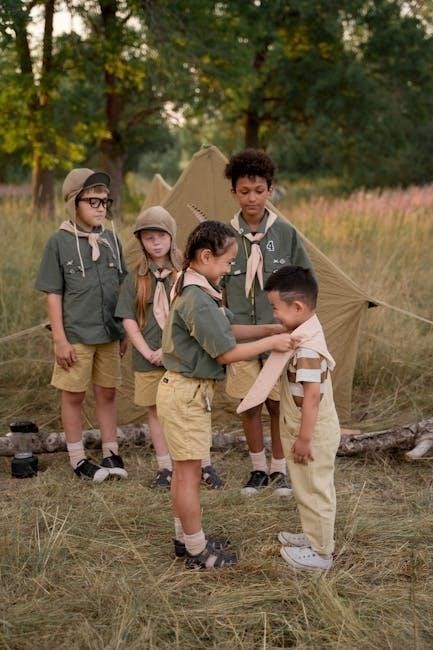
Free SEL Activities and Resources
Explore free SEL workbooks, guides, and activities, including “A Rose and a Thorn” and “Wrinkled Heart,” designed to support teachers and students in social-emotional growth.
30 Social-Emotional Learning Activities Guide
This comprehensive guide offers 30 engaging social-emotional learning activities, perfect for students of all ages. Designed to foster self-awareness, self-management, and social skills, the guide includes interactive exercises, group games, and reflective practices. Activities like “A Rose and a Thorn” encourage students to share their experiences, while “Wrinkled Heart” promotes kindness and empathy. Each activity is tailored to build resilience, improve relationships, and enhance emotional intelligence. The guide is an invaluable resource for educators, providing structured yet flexible lessons to support holistic student development.
SEL Student Workbook and Teacher Resources
The SEL Student Workbook and Teacher Resources provide a structured approach to fostering social-emotional learning. The workbook includes activities tailored to help students develop self-awareness, self-management, and relationship skills. Teachers benefit from accompanying resources that offer lesson plans, discussion prompts, and assessment tools. These materials are designed to create a supportive learning environment, promoting emotional intelligence and positive interactions. Available as free PDF downloads, they serve as invaluable supplements to classroom instruction, ensuring educators have the tools to guide students effectively in their SEL journey.
Free SEL Games for Kids and Teens
Free SEL games offer engaging ways to develop social-emotional skills in students. Games like GoNoodle and Minecraft Education provide interactive experiences that promote self-awareness, empathy, and teamwork. These tools are designed to be fun and educational, helping kids manage emotions and build strong relationships; Many free SEL games are available online, offering a variety of activities suitable for different age groups. They encourage active participation, problem-solving, and collaboration, making learning enjoyable and effective. These resources are perfect for classrooms and homes, supporting the development of essential life skills in a playful and accessible way.

Classroom-Friendly SEL Activities
Daily morning greetings, emotions check-ins, and group games foster connection and skill-building. Activities like GoNoodle and reflective discussions support social-emotional growth in an engaging, classroom-friendly manner.
Daily Morning Greetings and Check-Ins
Daily morning greetings and check-ins are simple yet powerful SEL activities that foster connection and emotional awareness. Start with a wave, handshake, or creative gesture to welcome students. Encourage them to share how they’re feeling, either aloud or through worksheets. This practice helps students develop self-awareness and builds a supportive classroom culture. It also provides insights into their emotional states, allowing teachers to address needs early. These check-ins can include reflection questions or sharing highlights, promoting empathy and understanding among peers. Consistency is key to making this ritual meaningful and impactful for all students. It sets a positive tone for the day ahead.
Emotions Check-In Worksheets
Emotions check-in worksheets are practical tools for helping students identify and express their feelings. These worksheets often include visual aids like emotion charts or color-coded scales, allowing students to articulate their emotional states. They can be completed individually or shared in small groups, fostering self-awareness and empathy. Many free PDF resources offer customizable templates, making it easy for teachers to adapt them to different age groups. Regular use of these worksheets helps students develop emotional literacy and communication skills, creating a supportive classroom environment. They also provide insights into students’ emotional well-being, enabling targeted support when needed.
Group Games for Social Skills
Group games for social skills are engaging activities that foster collaboration, empathy, and communication among students. Games like “Rose and Thorn” encourage students to share positive experiences and challenges, promoting active listening and understanding. “Emotions Charades” helps students recognize and express emotions through role-playing. These activities build teamwork, conflict resolution, and problem-solving skills. Many free PDF resources offer adaptable games for various age groups, ensuring inclusivity and fun. By participating in these games, students develop essential social skills while forming meaningful connections with peers, creating a supportive and interactive learning environment.

SEL Activities for Homework and Early Finishers
Engage students with 4-week SEL homework activities and interactive worksheets. These fun, educational tasks promote self-awareness and social skills, ideal for early finishers and home practice.
4-Week SEL Homework Activities
This 4-week program offers structured SEL tasks for students to complete at home or in class. Each week focuses on a specific skill, such as self-awareness or relationship building, with nine unique activities. These exercises are designed to be fun and engaging, helping students develop emotional intelligence and social skills. Parents and educators can easily incorporate these activities into daily routines, ensuring consistent SEL practice. The program is flexible, suitable for homework, early finishers, or extra practice, making it a valuable resource for promoting student well-being and success.
Fun and Interactive Worksheets
Engage students with fun and interactive worksheets designed to promote social-emotional learning. These no-prep activities cover skills like self-awareness, empathy, and decision-making. Worksheets include emotion check-ins, kindness challenges, and reflection prompts. They are easy to implement and suitable for various age groups, making SEL accessible and enjoyable. Many resources are available as free PDF downloads, offering educators a convenient way to integrate SEL into daily routines; These worksheets not only educate but also encourage students to think deeply about their emotions and interactions, fostering personal growth and resilience in a playful manner.
Early Finisher SEL Worksheets
Early finisher SEL worksheets provide engaging activities for students who complete tasks ahead of schedule. These resources reinforce social-emotional skills like self-awareness, empathy, and decision-making. Designed to be fun and educational, they include reflection prompts, emotion check-ins, and kindness challenges. Worksheets are ready to use, requiring minimal preparation, and cater to diverse learning needs. Many are available as free PDF downloads, making them easily accessible for educators. They ensure that all students, including early finishers, remain productively engaged while deepening their understanding of SEL principles. These activities promote personal growth and readiness for future challenges.
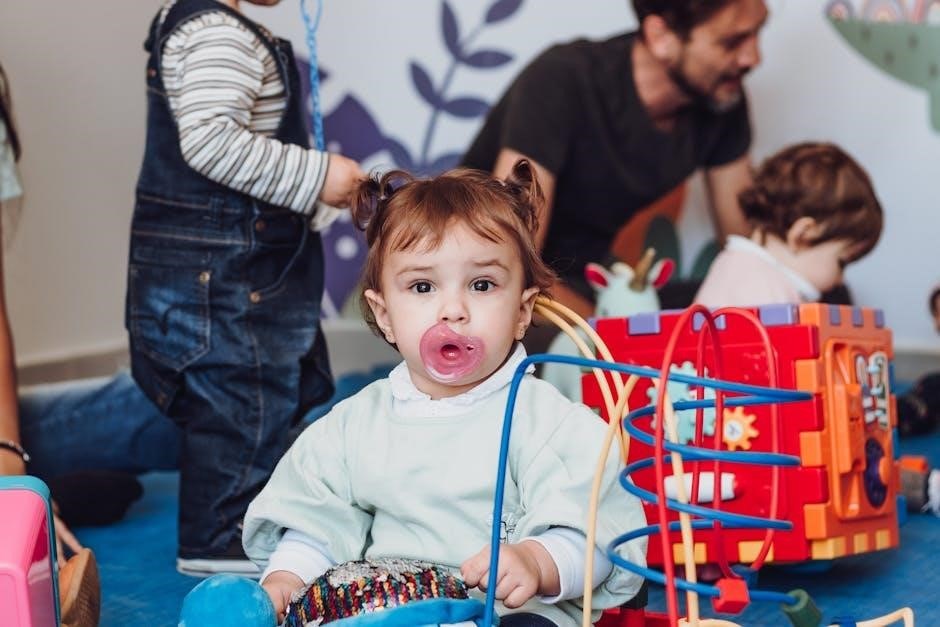
Digital and Online SEL Solutions
Digital tools like GoNoodle and Minecraft Education offer interactive SEL activities, promoting mindfulness, collaboration, and problem-solving. These platforms engage students in meaningful learning experiences online, fostering emotional growth.
GoNoodle for Educators
GoNoodle for Educators is an excellent digital resource offering interactive SEL activities. It provides movement-based games, mindfulness exercises, and emotional regulation tools. These activities help students relieve stress, stay focused, and develop self-awareness. Educators can use these engaging exercises to create a positive classroom environment, promoting both physical and emotional well-being. GoNoodle’s content is designed to support SEL core competencies, making it a valuable tool for integrating social-emotional learning into daily routines. Its accessibility and variety of activities ensure that students remain engaged while developing essential life skills.
Minecraft Education for SEL
Minecraft Education is a powerful tool for integrating social-emotional learning (SEL) into the classroom. Its game-based learning activities encourage collaboration, problem-solving, and creativity, fostering essential SEL skills. Students can explore diverse perspectives, develop empathy, and practice relationship skills through interactive scenarios. Minecraft’s open-ended nature allows students to express emotions and ideas while building resilience and self-awareness. Educators can use custom lessons to address SEL competencies, making learning both fun and impactful. This platform is an innovative way to engage students in SEL while enhancing their critical thinking and creativity.

Interactive SEL Games and Videos
Interactive SEL games and videos are dynamic tools that make social-emotional learning engaging and accessible for students. Platforms like GoNoodle offer movement-based activities that promote mindfulness and emotional regulation. These resources help students develop self-awareness, self-management, and relationship skills through fun, interactive experiences. Videos often include relatable scenarios that encourage empathy and responsible decision-making. Group games foster collaboration, problem-solving, and emotional expression, creating a supportive environment for students to grow. These digital solutions are perfect for integrating SEL into daily routines, ensuring students are both entertained and educated in essential life skills.
SEL Activities for Inclusion and Diversity
SEL activities for inclusion and diversity focus on fostering empathy, kindness, and acceptance. These exercises promote understanding of differences, encouraging inclusive environments and positive relationships among students.
Accepting Differences Social Skills Story
The “Accepting Differences Social Skills Story” is a powerful tool for promoting kindness and inclusion in the classroom; This story helps students understand and appreciate individual differences, fostering empathy and respect. By sharing examples of acceptance, it encourages students to embrace diversity and build positive relationships. The story is often paired with discussion questions and activities to reinforce its message. It is part of free SEL resources available as downloadable PDFs, making it accessible for educators to integrate into their lesson plans. This activity creates a foundation for an inclusive and supportive learning environment.
Kindness and Empathy Activities
Kindness and empathy activities are essential for fostering positive relationships and emotional well-being. These exercises help students understand others’ feelings and perspectives. Activities include creating kindness chains, writing compliment cards, and role-playing scenarios that encourage compassionate responses. Educators can use free downloadable PDFs with prompts and guides to implement these activities seamlessly. Group discussions and reflective journaling also play a key role in deepening students’ understanding of empathy. By engaging in these practices, students develop the ability to connect with peers on a deeper level, creating a more supportive and inclusive classroom environment. These resources are designed to be accessible and easy to integrate into daily lessons.
Wrinkled Heart Kindness Activity
The Wrinkled Heart Kindness Activity is a powerful tool for teaching empathy and kindness. Students write ways they can show kindness on a heart-shaped paper, then crumple it to create wrinkles, symbolizing the impact of their actions. This activity fosters a deeper understanding of how small acts of kindness can make a big difference. It encourages reflection and compassion, helping students develop essential social-emotional skills. The wrinkled heart serves as a visual reminder of the importance of spreading kindness. This activity is widely used in classrooms and is available as a free downloadable PDF, making it an accessible resource for educators. It promotes a culture of empathy and inclusivity, helping students grow into caring individuals.
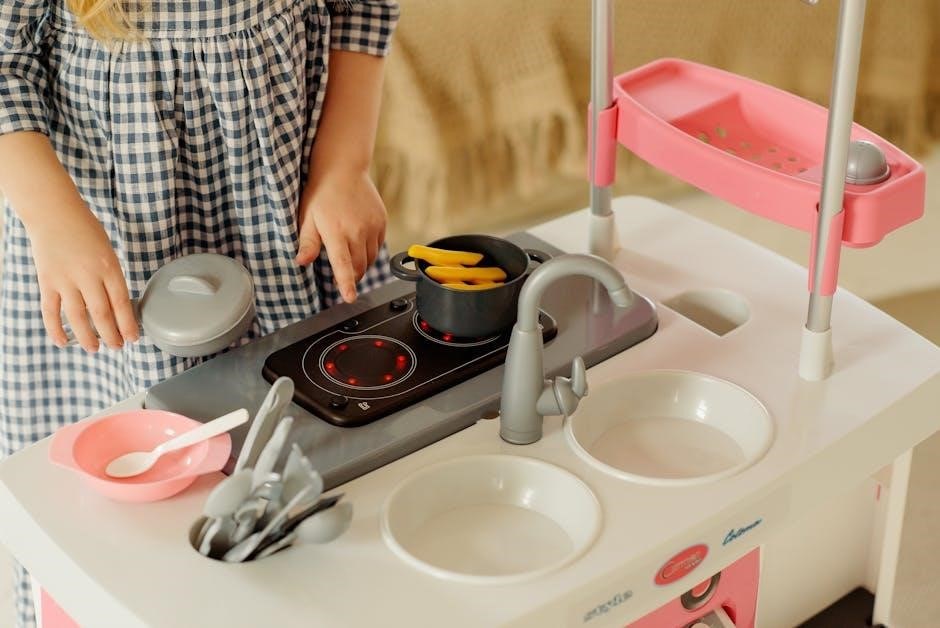
Journaling and Reflection Activities
Journaling and reflection activities foster self-awareness, gratitude, and personal growth. Students explore emotions, thoughts, and experiences through writing, enhancing emotional intelligence and self-expression. These exercises are available as free SEL PDF resources.
Gratitude Journaling for Students
Gratitude journaling is a powerful SEL activity that fosters positivity and well-being. Students reflect on daily experiences, identifying things they are thankful for, such as supportive friends or family. This practice enhances emotional awareness and cultivates a positive mindset. Teachers can provide guided prompts, like “Write about a time someone helped you” or “List three good things that happened today.” Free PDF resources offer structured templates and creative exercises to make journaling engaging and accessible. By focusing on gratitude, students develop resilience and a deeper appreciation for life’s joys, aligning with core SEL competencies and promoting personal growth.
End-of-Day Reflection Questions
End-of-day reflection questions are a simple yet effective SEL activity to promote self-awareness and introspection. Teachers can ask students to consider prompts like “What did you learn today?” or “How did your actions impact others?” These questions encourage students to evaluate their emotions, behaviors, and experiences. Free PDF resources provide structured worksheets with guided questions, making it easy for educators to implement this practice. Regular reflection helps students develop emotional intelligence, accountability, and a growth mindset, aligning with key SEL goals and fostering personal and academic growth.
Positive Affirmations for Self-Confidence
Positive affirmations are powerful tools to boost self-confidence and nurture a positive mindset in students. Free SEL resources offer printable affirmation cards and worksheets that guide students in practicing self-affirming statements. These activities help students recognize their strengths, build resilience, and develop a growth mindset. Teachers can incorporate affirmations into daily routines, such as morning check-ins or end-of-day reflections. By fostering self-confidence, students are better equipped to handle challenges, take risks, and thrive academically and socially, aligning with key SEL objectives of self-awareness and emotional well-being.
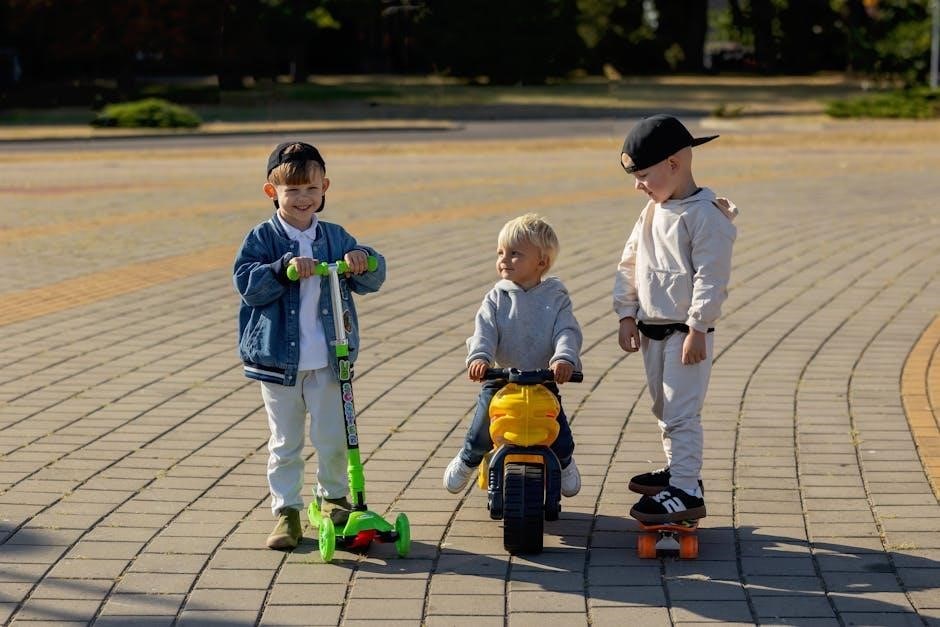
Community and Family Involvement
Engage families and communities in SEL through shared activities and resources, fostering collaboration and extending learning beyond the classroom for holistic student development and support.
Family SEL Activities for Home
Families play a crucial role in reinforcing SEL skills at home. Free PDF resources, such as workbooks and activity guides, offer practical ways for parents to engage with their children. These materials often include exercises like emotion recognition games, gratitude journaling, and discussions on empathy. Activities like creating a “Family Feelings Chart” or “Kindness Challenges” foster emotional awareness and positive relationships. By involving families, educators extend SEL beyond the classroom, ensuring consistent support for children’s social-emotional growth. These tools empower parents to collaborate with teachers, creating a unified approach to nurturing essential life skills.
Partnering with Parents for SEL
Collaborating with parents is essential for effective SEL implementation. Schools can provide parents with free SEL resources, such as PDF guides and activity worksheets, to support their child’s learning at home. Regular communication through newsletters or workshops helps align home and school efforts. By sharing SEL strategies, educators empower parents to reinforce skills like empathy and self-regulation. This partnership ensures consistency, fostering a supportive environment for children to thrive socially and emotionally, both in and out of the classroom, while promoting a holistic approach to their development.
Organizing Community Service Days
Community service days offer students meaningful opportunities to develop social-emotional skills through real-world applications. These events, such as cleaning parks or organizing food drives, foster empathy, teamwork, and responsibility. By engaging in activities that benefit others, students build connections and understand the impact of their actions. Schools can provide free PDF guides with ideas for service projects, ensuring accessibility for all. These experiences align with SEL competencies like social awareness and relationship skills, creating a sense of community and purpose. Encouraging reflection post-service enhances learning, helping students appreciate the value of contributing to society. Such initiatives empower students to become compassionate, active citizens.
Final Thoughts on SEL Activities
Social-Emotional Learning (SEL) activities are transformative, fostering emotional growth, empathy, and self-awareness in students. With free resources like workbooks, games, and online tools, educators can seamlessly integrate SEL into daily routines. From morning check-ins to interactive worksheets, these activities promote a supportive classroom environment. Tools like GoNoodle and Minecraft Education enhance engagement, while printable worksheets and reflection exercises encourage deeper self-reflection. By prioritizing SEL, schools empower students to navigate challenges, build strong relationships, and thrive academically and personally. Free SEL resources make it accessible for all educators to create a positive, inclusive learning space.